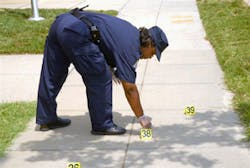Editor's Note: This is Part I of a two part article. Part II coming March 2009.
Police departments throughout the nation are continually seeking ways to improve efficiency and to ensure their crime fighting tasks are conducted properly. With budget cuts dominating a significant number of localities, police executives are cognizant of the fact that they must remain realistic in their evaluation and analysis of organizational effectiveness and be creative with solutions. The development of new or different operational strategies and alternative plans are changing the manner in which various departments function. Some, more than others, are willing to accept the challenging prospect of utilizing a greater degree of flexibility in the allocation and types of positions, as well as their aligned roles and function, within the police agency.
Consequently, an increasing number of police departments throughout the nation have already begun to hire and utilize civilians. For other departments that may have already had civilians on board, they are augmenting their numbers and expanding their roles.
Chief Ronald L. Davis of the East Palo Alto Police Department, and a law enforcement veteran of 23 years, believes civilians are critical to the police organization. He already has civilians in place within his agency including a civilian Administrative Service Manager that is part of his executive management team and is the equivalent level of a captain.
While departments are dealing with the challenges of shrinking budgets, he believes they must learn how to use civilians to provide services to the community. Chief Davis is of the opinion that it is important to match a civilian's skills and qualifications with the tasks. The chief has a total of 11 civilians in a department comprised of 54 officers. Civilians are used in the areas of crime analysis, and the chief presently has two civilian investigators who are former cops. Civilians are also employed in the areas of property and evidence, and Code Enforcement Officers conduct building inspections and handle nuisance and abatement cases. Civilians are utilized in community services where they facilitate meetings with community groups, take reports, and tow vehicles. Additionally, civilians work in the areas of personnel and budget.
"The next phase for me is to hire civilians to take police reports in the field," says Chief Davis. He envisions civilian analysts and investigators subsequently calling their sworn counterparts to make the arrests. Chief Davis recognizes the need to have sworn officers focus on core functions that include patrol and investigations.
Similarly, in Virginia, the Prince William County Police Department utilizes civilians in various capacities, and, like Chief Davis' department, has a civilian who serves as the Senior Administrative Manager that is in charge of planning and the budget process. A civilian also serves as the firearms instructor, one is also in charge of personal protective equipment and testing, and a civilian fulfills the role of Records Manager within the department - all of which were traditionally sworn positions. A civilian also fulfills the role of an in-service training coordinator. There are currently three fingerprint examiners, one photo lab technician, and two civilian crime scene specialists.
The movement towards placing more civilians within this department has been going on for more than ten years, but it has expanded. "I think it depends upon the philosophy of the chief executive of the agency. It frees up sworn positions to do what they are experienced in doing," says Captain Alfred Miller. "If civilians are not competing for a promotion, they don't have as much at stake. They can give perspectives and insights valuable to policies," adds Captain Miller. He explains that the advantage of having civilians in law enforcement agencies include saving money and equipment as well as salary benefits.
Heeding cost effectiveness, as well, The Las Vegas Nevada Metropolitan Police Department is also utilizing civilians. The department employs civilian Investigative Specialists who conduct case management, do computer inquiries, perform background checks, file interview cards of officer reports, and are present at action meetings. This year, 13 more Investigative Specialist positions have been approved. "Every single detective unit wants one," says Lynne Jantz, the Director of Selection and Classification.
Within the department, civilian Crime Analysts predict crime trends and compile the information for review. Civilians interview witnesses and provide community referrals. Ms. Jantz acknowledges that civilians provide an opportunity to place more officers on the street so they can do their work that, oftentimes, she says, "can be volatile."
Deputy Chief John Conley of the Indianapolis Metropolitan Police Department, and a 32-year veteran, concurs with the idea of placing more officers on the street. "As with all major cities today, we are constantly looking for ways to use the resources we have without stretching the budget until it breaks. The use of technical specialists as civilian employees will help free up sworn officer time by assisting with reports and public contacts that take up a lot of the officers patrol time. This is critical in reducing our crime rates. Accident reports and reports for insurance purposes can account for a large percentage of officers' down time. These civilian specialists can actually reduce the amount of officers needed to police a certain area by freeing up the officer currently there to handle the work load. Along with that, they provide great service to the community because they become specialized in the areas that they handle," he says.
His department utilizes Front Desk Aides as well as Public Safety Officers. The duties of the Front Desk Aides include building security, taking extra patrol requests, unattended house reports, narcotic complaints, and managing all phone calls. They can also take reports for abandoned or lost property, damage to property, delayed battery, delayed garage or storage burglary, delayed theft, obscene, harassing, or threatening phone calls, and criminal mischief, fraud, forgery, and identity theft that occur in their jurisdiction. These aides are also utilized as Detective Aides to assist detectives in following up with victims. Public Safety Officers may work in parking and intersection control, deal with accidents, and assist with motorist and vehicle issues.
The Victim Assistance Unit within the police department is also comprised of civilians. It is the first 24-hour on call, 7 day per week, and 365 day per year crisis intervention unit within a U. S. law enforcement agency. The unit is comprised of civilians that include a Victim Assistance Manager, a Violent Crime Compensation Liaison, a Volunteer Coordinator, two Good Touch/Bad Touch Presenters, and 11 on-the-scene crisis counselors. The main focus of the unit is on-scene crisis intervention, and the civilian workers have the authority to respond to a scene in unmarked cruisers. They all carry radios and pagers. They may transport a witness to the scene, a victim to the hospital, or a domestic violence victim to a shelter.
The members of this unit respond to any type of crime - or even incidents that are not crimes - but ones in which some type of trauma may be involved such as accidental drowning or Sudden Infant Death Syndrome (SIDS). They also conduct death notifications, assist victims with violent crime compensation claims and help them obtain other financial resources. This unit works closely with police officers and because they are employed by the police department, they are able to share important information with one another. "We are on the same team," says Lisa Brown, the Victim Assistance Manager of the unit.
Teamwork is a critical component, and Part II of this article, coming in March 2009, will discuss this further as it relates to civilians working in law enforcement agencies.
About the Author

Karen L. Bune
Victim Specialist Contributor
Karen L. Bune is a Victim Specialist in the domestic violence unit of the State's Attorney's Office for Prince George's County, Md. She serves as an Adjunct Professor in the Dept. of Criminal Justice at George Mason University and Marymount University in Virginia where she teaches victimology. Ms. Bune is a nationally recognized consultant on victim issues. She is Board Certified in Traumatic Stress and Domestic Violence, and she is a Fellow of the Academy of Experts in Traumatic Stress. She appears in the 2007 edition of Marquis "Who's Who in the World."
